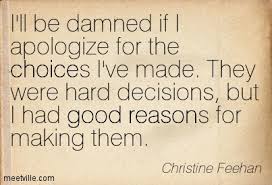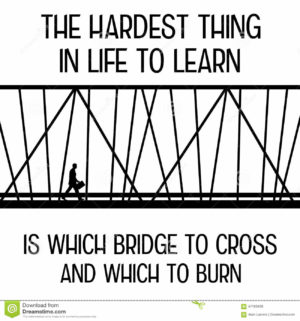So we continue with part two of “Making Decisions”, reflections on human wisdom illustrated in our lives and in Scripture.
Session #1 could be summarized by one word “perspective.” The importance of making decisions in the light of our experiences (good, bad and indifferent) and our abilities, in the light of the wisdom of others and the impact our decisions have on others.
Most important, though, is the intentional awareness of decisions being made in the perspective, in the context of God who loves us whatever decisions we make. This is the God who strengthens our resolve and, where necessary, cleans up after our messes and leads us forward.
 Session #2 is largely concerned with the making of decisions in unhealthy states; we also address the courage and humility we need to accept that sometimes we have made the wrong decision albeit with the very best of intention.
Session #2 is largely concerned with the making of decisions in unhealthy states; we also address the courage and humility we need to accept that sometimes we have made the wrong decision albeit with the very best of intention.
The Scripture passages about Herod and Jephthah describe decisions that should have been unmade; note the condition of the men who made them… drunk, lustful and eager for victory.
The remaining two passages present us with the challenge of God who is seen to relent, to change his mind.
Here are the study notes…
MAKING DECISIONS
#2 – The Problems
Sunday January 22 2017
- Review from Class #1 – in one word?
“Perspective” – ourselves, others, circumstances and the God with whom we deal. Faith!
- What makes decision making difficult? What are the besetting problems
- Fear of failure
- Shame
- Punishment
- Lack of experience
Decision Making Problems in the Bible
Matthew 14:8-12
6-12 But at his birthday celebration, he got his chance. Herodias’s daughter provided the entertainment, dancing for the guests. She swept Herod away. In his drunken enthusiasm, he promised her on oath anything she wanted. Already coached by her mother, she was ready: “Give me, served up on a platter, the head of John the Baptizer.” That sobered the king up fast. Unwilling to lose face with his guests, he did it—ordered John’s head cut off and presented to the girl on a platter. She in turn gave it to her mother. Later, John’s disciples got the body, gave it a reverent burial, and reported to Jesus.
Judges 11
29-31 God’s Spirit came upon Jephthah. He went across Gilead and Manasseh, went through Mizpah of Gilead, and from there approached the Ammonites. Jephthah made a vow before God: “If you give me a clear victory over the Ammonites, then I’ll give to God whatever comes out of the door of my house to meet me when I return in one piece from among the Ammonites—I’ll offer it up in a sacrificial burnt offering.”
32-33 Then Jephthah was off to fight the Ammonites. And God gave them to him. He beat them soundly, all the way from Aroer to the area around Minnith as far as Abel Keramim—twenty cities! A massacre! Ammonites brought to their knees by the People of Israel.
34-35 Jephthah came home to Mizpah. His daughter ran from the house to welcome him home—dancing to tambourines! She was his only child. He had no son or daughter except her. When he realized who it was, he ripped his clothes, saying, “Ah, dearest daughter—I’m dirt. I’m despicable. My heart is torn to shreds. I made a vow to God and I can’t take it back!” pg.1
36 She said, “Dear father, if you made a vow to God, do to me what you vowed; God did his part and saved you from your Ammonite enemies.”
37 And then she said to her father, “But let this one thing be done for me. Give me two months to wander through the hills and lament my virginity since I will never marry, I and my dear friends.”
38-39 “Oh yes, go,” he said. He sent her off for two months. She and her dear girlfriends went among the hills, lamenting that she would never marry. At the end of the two months, she came back to her father. He fulfilled the vow with her that he had made. She had never slept with a man.
39-40 It became a custom in Israel that for four days every year the young women of Israel went out to mourn for the daughter of Jephthah the Gileadite.
Exod. 32:11-14
Then Moses pleaded with the LORD his God, and said: “LORD, why does Your wrath burn hot against Your people whom You have brought out of the land of Egypt with great power and with a mighty hand? Why should the Egyptians speak, and say, ‘He brought them out to harm them, to kill them in the mountains, and to consume them from the face of the earth’? Turn from Your fierce wrath, and relent from this harm to Your people. Remember Abraham, Isaac, and Israel, Your servants, to whom You swore by Your own self, and said to them, ‘I will multiply your descendants as the stars of heaven; and all this land that I have spoken of I give to your descendants, and they shall inherit it forever.” So the LORD relented from the harm which He said He would do to His people.
Jonah 3
4 Jonah entered the city, went one day’s walk and preached, “In forty days Nineveh will be smashed.”
5 The people of Nineveh listened, and trusted God. They proclaimed a citywide fast and dressed in burlap to show their repentance. Everyone did it—rich and poor, famous and obscure, leaders and followers.
6-9 When the message reached the king of Nineveh, he got up off his throne, threw down his royal robes, dressed in burlap, and sat down in the dirt. Then he issued a public proclamation throughout Nineveh, authorized by him and his leaders: “Not one drop of water, not one bite of food for man, woman, or animal, including your herds and flocks! Dress them all, both people and animals, in burlap, and send up a cry for help to God. Everyone must turn around, turn back from an evil life and the violent ways that stain their hands. Who knows? Maybe God will turn around and change his mind about us, quit being angry with us and let us live!”
10 God saw what they had done, that they had turned away from their evil lives. He did change his mind about them. What he said he would do to them he didn’t do.
4 1-2 Jonah was furious. He lost his temper. He yelled at God, “God! I knew it—when I was back home, I knew this was going to happen! That’s why I ran off to Tarshish! I knew you were sheer grace and mercy, not easily angered, rich in love, and ready at the drop of a hat to turn your plans of punishment into a program of forgiveness!
Reflections on making “decision-making” easier.
The factors facilitating and inhibiting effective clinical decision-making in nursing: a qualitative study
Mohsen Adib Hagbaghery, Mahvash Salsali and Fazlolah Ahmadi2
Author information ► Article notes ► Copyright and License information ►
This article has been cited by other articles in PMC.
Background
Nurses’ practice takes place in a context of ongoing advances in research and technology. The dynamic and uncertain nature of health care environment requires nurses to be competent decision-makers in order to respond to clients’ needs. Recently, the public and the government have criticized Iranian nurses because of poor quality of patient care. However nurses’ views and experiences on factors that affect their clinical function and clinical decision-making have rarely been studied.
Methods
Grounded theory methodology was used to analyze the participants’ lived experiences and their viewpoints regarding the factors affecting their clinical function and clinical decision-making. Semi-structured interviews and participant observation methods were used to gather the data. Thirty-eight participants were interviewed and twelve sessions of observation were carried out. Constant comparative analysis method was used to analyze the data.
Results
Five main themes emerged from the data. From the participants’ points of view, “feeling competent”, “being self-confident”, “organizational structure”, “nursing education”, and “being supported” were considered as important factors in effective clinical decision-making.
Conclusion
As participants in this research implied, being competent and self-confident are the most important personal factors influencing nurses clinical decision-making. Also external factors such as organizational structure, access to supportive resources and nursing education have strengthening or inhibiting effects on the nurses’ decisions. Individual nurses, professional associations, schools of nursing, nurse educators, organizations that employ nurses and government all have responsibility for developing and finding strategies that facilitate nurses’ effective clinical decision-making. They are responsible for identifying barriers and enhancing factors within the organizational structure that facilitate nurses’ clinical decision-making.
8 Things You Don’t Know Are Affecting Our Choices Every Day: The Science of Decision Making Written by Belle Beth Cooper
How to make better decisions
Since we have all of this information, let’s see how we can put it to use and make better decisions.
- Make your decisions in the morning
With a combination of serotonin and dopamine levels, and no decision fatigue to get you down, the morning is the best time to make big decisions. If you do have to make big decisions in the afternoon, you could try taking a nap or just a relaxing break to reset your brain first.
- Eat first
We know all about not doing the grocery shopping on an empty stomach, right? Well it seems like we don’t want to make any decisions when we’re hungry if we can avoid it. Try to keep your physical desires taken care of before meetings or phone calls when you’ll be called on to make some big choices.
- Cut down your choices
We often settle for default options or let others decide for us because decisions are just too much work for our brains. This is particularly so when there are more than two options to choose from. You can help your brain out by cutting out any extra options you don’t need. Cut your choices right down to a tiny shortlist and you’ll have an easier time of making a final decision.
- Open the windows
Keeping the CO2 levels low in your home or workspace is really important for all cognitive functions, not just decision-making. Adding plants will certainly help, but try to keep fresh air circulating as well, particularly in high-traffic areas where lots of people are around, contributing to the CO2 levels.
- Use a foreign language
If you know one, this could be really useful. Particularly when there are lots of emotions involved, or you want to protect yourself against things like emotional marketing strategies. Try explaining the situation to yourself and replying with your decision in a foreign language and see how differently you process that information.
Making decisions is something we do every day, so I wanted to find out more about how this process works and what affects the choices we make. It turns out, there are some really interesting ways our decisions are affected that I never would have guessed. Luckily, we can take action to improve most of these.

